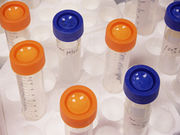Insulin sensitivity lower during oral versus IV glucose administration; difference amplified in obese
WEDNESDAY, Sept. 13, 2017 (HealthDay News) — Intestinal glucose stimulation has an anti-incretin effect, down regulating insulin sensitivity, according to a study published online Aug. 29 in Diabetes.
Serenella Salinari, D.Sc., from the University of Rome “La Sapienza,” and colleagues studied eight healthy volunteers and eight severely obese individuals with insulin resistance. After oral glucose tolerance test and isoglycemic intravenous glucose injection, the authors measured insulin secretion, insulin sensitivity, rate of glucose appearance, and disposition index. Obese individuals were assessed before and after intestinal bypass (biliopancreatic diversion [BPD]).
The researchers found that insulin sensitivity was lower during oral versus intravenous glucose administration, despite isoglycemic conditions. The difference was greater in obese subjects, and declined to normal following BPD. No evidence was found for glucose malabsorption. If insulin sensitivity was not reduced by oral glucose stimulation, mathematical simulations showed that hypoglycemia would occur.
“The findings support a new model for how foodborne factors can induce insulin-resistance and provide a possible explanation for the improvement of insulin resistance/diabetes after gastrointestinal bypass surgery,” the authors write.
Copyright © 2017 HealthDay. All rights reserved.








